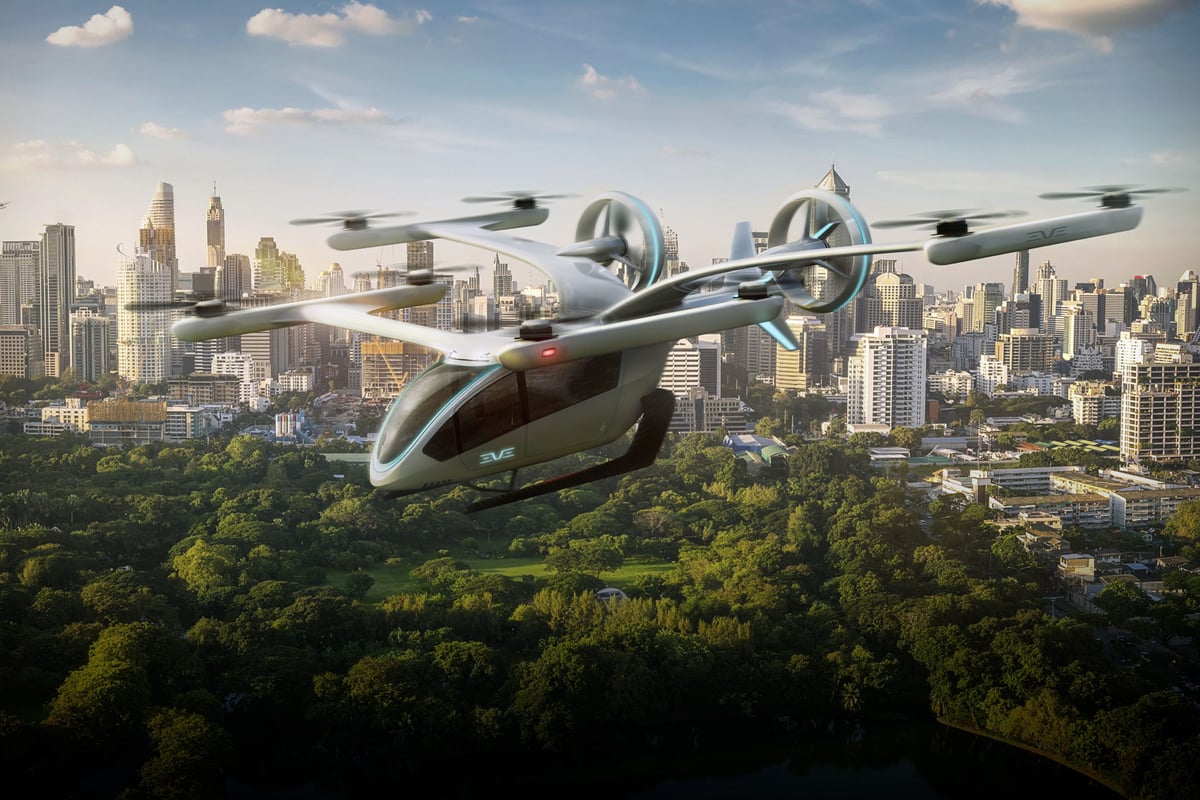Click Here to View This Page on Production Frontend
Click Here to Export Node Content
Click Here to View Printer-Friendly Version (Raw Backend)
Note: front-end display has links to styled print versions.
Content Node ID: 419582
The long-term viability of the eVTOL aircraft market will depend on the ability to adapt and certify the segment’s vehicles for autonomous flight, according to Embraer executives assembled at the company’s main facilities in Sao Jose dos Campos, Brazil, for a series of media briefings this week. Discussing the prospects for the eVTOL vehicle under development by Eve Urban Air Mobility, which is majority-owned by the aircraft manufacturer, Embraer's engineering head Luis Carlos Affonso said a key benefit of advanced air mobility lies with the immunity from pilot shortages full flight autonomy would allow.
Eve aims to start deliveries of its four-passenger eVTOL model in 2026, and already has collected more than 1,800 provisional commitments from operators. Initially, the planned air taxi services will operate with a pilot on board.
“This is something that could dramatically change the economics and allow the industry to grow because today there is a shortage of pilots,” he explained. “If you think of eVTOL [aircraft] today, it’s one pilot for four passengers…Eve will only fulfill the vision of scaling if it is autonomous.”
Eve co-CEO Andre Stein didn’t disagree that, in the long-term, large-scale adoption of eVTOL applications eventually will require flight autonomy. However, he also acknowledged that it will take some time for regulators and the public to accept the concept.
“There is enough market to start,” said Stein. “It’s not like you’re going to have 50,000 aircraft by 2026. But to reach the market that you’re talking about [50,000 aircraft by 2035], you’re going to need [autonomous operation]. But to start you don’t.”
Stein noted that enough markets exist today to make a business case based on the cost savings that an eVTOL machine offers over a conventional helicopter. “Even if you can expect to [operate an eVTOL aircraft] for something about six times less than an equivalent turbine helicopter that can do the same mission, that addresses a lot of markets already,” he explained. “But to scale, I completely agree [with Affonso].”
Stein added that the adoption of autonomous operation will not happen uniformly across various markets. Markets in Asia, for example, will likely see pilotless eVTOL flights before the U.S. does, he explained. “Some regions might have it pretty soon," said Stein. "You’re seeing things happen in China, for example, with other players. But to have that with the FAA might take longer.”
Eve has acknowledged the challenge of overcoming people’s safety concerns about flights with no pilot on board and Stein called for early engagement with the public and regulators. The fact that autonomous ground vehicles will likely come first will also help, he said. “And that’s a much harder point, both in terms of technology and perception,” he said, referring to the adoption of autonomous cars. “So if that’s in place it will help create the perception that these things are safe.”
In fact, Stein maintained, autonomous cars will present more of a technological challenge than autonomous eVTOL operations “by a big margin.”
“It will be a very structured operation…no drunken guy crossing in front of you in the sky,” he said. “You will be flying a known network, you’ll know where you’re going to fly and your alternate even before you take off.”
Embraer and Eve last month concluded a 30-day trial with Brazilian helicopter operator Helisul to evaluate autonomous operations over Rio de Janeiro. The aerial data collection and real-time evaluation of the technologies in urban scenarios used regular piloted helicopters as part of the Embraer Autonomous Systems project (Project EASy).
During the trial, Embraer and Eve and program partners Daedalean, Iris Automation, and Near Earth Autonomy explored various scenarios for takeoff, climb, cruise, approach, and landing phases of flight.
